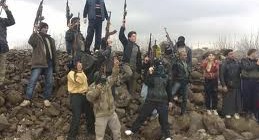Credit: Danny Dougherty/McClatchy Washington Bureau
In October 2011, President Obama launched the Insider Threats program in an effort to clamp down on leaks not just in the national security agencies, but in the entirety of the Federal Government. This program was in reaction to an incident in which Army Pfc. Bradley Manning downloaded hundreds of thousands of documents from a classified computer network and sent them to WikiLeaks, the anti-government secrecy group. But just this past November, President Obama approved “minimum standards,” giving departments and agencies a lot of flexibility in developing their Insider Threats programs. He instructed them to not only look for leakers but also people who might be prone to “violent acts against the government or the nation” and “potential espionage.” As McCLatchy reports, Obama is expected to ramp up this scarcely known program in the wake of the Edward Snowden leaks about the NSA.
Some of the agencies under the umbrella of Insider Threats include the Social Security, Agriculture and Education Departments - even the Peace Corps. These agencies are using the “latitude (of the program) to pursue unauthorized disclosures of any information, not just classified material” and that ”millions of federal employees and contractors must watch for ‘high-risk persons or behaviors’ among co-workers and could face penalties, including criminal charges, for failing to report them. Leaks to the media are equated with espionage.”
The WikiLeaks incident raised government concerns over whistleblowing.
Credit: Epoch Times
Because the program is loosely defined, it’s up to each bureaucracy and agency to implement their own guidelines. Following are some of the ways these federal departments are enforcing Insider Threats:
The Pentagon established its own broad definition of an insider threat as an employee with a clearance who “wittingly or unwittingly” harms “national security interests” through “unauthorized disclosure, data modification, espionage, terrorism, or kinetic actions resulting in loss or degradation of resources or capabilities.”
The Defense Department’s anti-leak strategy calls for a zero-tolerance policy. ”Hammer this fact home . . . leaking is tantamount to aiding the enemies of the United States,” says a June 1, 2012, Defense Department strategy for the program. Security managers “must” reprimand or revoke the security clearances of workers who commit one serious infraction or multiple lesser breaches. This would be a career-killing move but is “ an unavoidable negative personnel action.”
Under the Insider Threats program, the Pentagon has the authority to crack down on leaks before they occur.
Credit: Politico
The Department of Education tells its employees to be on the lookout for those who may be going through certain life experiences such as divorce, frustration or financial problems as those might indicate a pending insider threat.
The Department of Agriculture and National Oceanic and Atmospheric Administration employees are to recognize the psychological profile of spies from watching an online tutorial entitled “Treason 101.”
A Defense Security Service pamphlet found online lists a wide range of “reportable” behaviors that includes working overtime. The DSS pamphlet says that not every behavior “represents a spy in our midst. Every situation needs to be examined to determine whether our nation’s secrets are at risk.”
The Peace Corps is in the midst of figuring out its strategy but sent an email that said it “takes very seriously the obligation to protect sensitive information.” The email sender insisted on anonymity.
There are laws protecting whistleblowers. The danger with the Insider Threats program, though, is that people are being scrutinized in unprecedented ways before they might ever decide to blow the whistle. And authorities have no idea if a breach is even going to occur. Is an observation by a co-worker grounds for reporting an individual when accusations are based only on loose, subjective guidelines promulgated through bureaucracies?
“The real danger is that you get a bland common denominator working in the government,” warned Ilana Greenstein, a former CIA case officer who quit the agency after being falsely accused of being a security risk. “You don’t get people speaking up when there’s wrongdoing. You don’t get people who look at things in a different way and who are willing to stand up for things. What you get are people who toe the party line, and that’s really dangerous for national security.”






